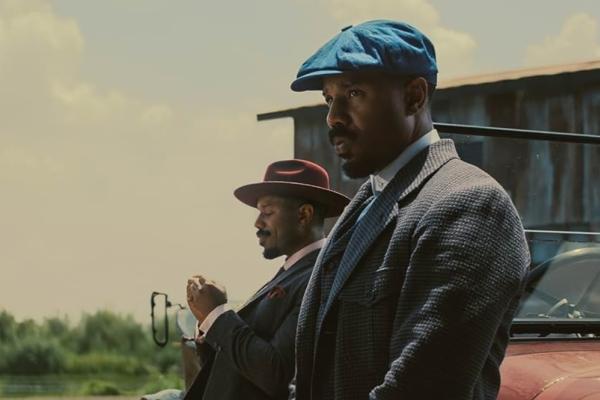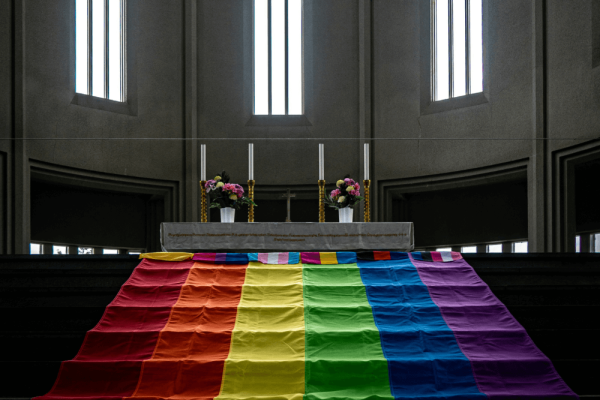The Bulgarian town where director Ivaylo Hristov’s latest film takes place is never named, but the movie’s title offers a suitable stand-in: Fear. This coastal village on Turkey’s border reeks of terror, but not the kind one might expect. There’s no supernatural force that threatens the townspeople, and composer Kiril Donchev’s score never ventures into explicitly bone-chilling territory. But the film’s documentation of the residents’ daily lives — shot in a bleak black and white — makes one thing clear: This is a town that fears disruption above all else.
When the town’s border patrol agents capture Afghanistan-fleeing refugees, the displaced persons are quickly thrown into an abandoned school with poor sanitation. As justification, the townspeople utter, “We are a hospitable people, but Bulgaria belongs to the Bulgarians.” They have made peace with their biases and prejudices, and will do almost anything to protect that peace.
Fear, which is now available to rent on demand, is especially convicting in light of the Ukrainian refugees who are fleeing their homeland due to Russia’s ongoing invasion. There are painful parallels to the ways the Bulgarian people in Fear treat the refugees who have come seeking asylum to how refugees are received by countries today. While it is encouraging that nearly seven out of 10 Americans are in favor of accepting refugees from Ukraine, there’s reason to believe this favor has an expiration date. As Sarah Einselen reported for Sojourners, Americans initially supported the resettlement of Syrian refugees displaced in 2015 — people who were literally fleeing the “same bombs from the Russian government” that the Ukranian refugees are fleeing today. Yet after the 2015 terrorist attacks in Paris, many Americans wrongly believed Syrian refugees were involved, and U.S. politicians used this false belief to attempt to ban Syrians from entering the United States. Under crisis and over time, fear crept in, and the surface-level favor and love was revealed for what it truly was: performative hospitality. Similarly, in Fear, the hospitality is hollow. Because of the Bulgarians’ unground whims and fears, the refugees have outworn their welcome the moment they cross the border.
In one scene, as the Afghan refugees get ready to move into the school, they are addressed by the town’s mayor (played by Kristina Yaneva). She cannot speak English, so she has a Bulgarian school boy named Svetlyo (played by Momchil Ilkov) translate for her. When she tells him to translate to the refugees that “the living conditions are not good, but everything is from the heart,” Svetlyo privately asks her to elaborate. She tries to downplay the severity of the conditions and mutters to him, “There’s some moisture on the walls and the toilets are dirty.” The boy’s translation is cheeky and revealing: “In the bathroom there is shit but it is from the heart. Welcome!”
No one is fooled: Despite the mayor’s words, these refugees are not welcome. Their new “home” might as well be a prison.
It is in this cultural context where we meet Svetla (played by Svetlana Yancheva), a widowed schoolteacher. Like the rest of her neighbors, underneath her verisimilitude of tolerance for the refugees, Svetla has a deep disdain for those who aren’t Bulgarian. She prefers to be away from the refugees, keeping them at arm’s — or rather, at rifle’s — length.
One day, as she is hunting for hares in the forest, she is startled by the appearance of a refugee named Bamba (played by Michael Flemming), a Malian refugee who has lost his wife and children due to a war and is fleeing to Germany. Fueled by her prejudice and racism, she vociferously orders Bamba to go “back to where he came from,” but Bamba does not understand due to the language barrier. Holding him at gunpoint, she brings him back to her house until she can drop him off to the authorities. While at her house, Svetla takes on the role of a reluctant Samaritan, begrudgingly feeding, clothing, and talking to her “enemy.” During one such dinner, Svetla takes advantage of Bamba’s inability to understand Bulgarian, and in-between his attempts at conversation, she mutters curses and insults under her breath. He remains unfazed by her obvious disdain, and over time, tries his best to learn Bulgarian, with the two eventually being able to converse in broken sentences. Bamba exudes a genuine posture of curiosity to know the person sitting before him. Disarmed by Bamba’s disposition, as the two begin to share more stories with each other over meals, they move from tolerance to genuine friendship to even possible romance (it is never quite clear in the film).
However, as Svetla gets to know Bamba better, the prejudice of her community increases. The townspeople are flabbergasted by Svelta’s hospitality. Again, the townspeople say, “We are a hospitable people, but Bulgaria belongs to the Bulgarians.” The more they say it, the more threatening the refrain becomes. Svetla must choose between performative hospitality and true hospitality: one that “saves” her but hurts Bamba, or one of mutuality, where Bamba’s suffering becomes her suffering.
In the story of the Good Samaritan, Jesus makes it a point to note that it was the Samaritan, the enemy of the Jews — not the pious priest or the orthodox Levites — who saved the man beaten at the Jericho Road. The Good Samaritan bandaged the injured man’s wounds, “pouring on oil and wine,” and fully restored the man to good health, bringing him to an inn and paying for “any extra expense[s] [he] may have” (Luke 10:35, NIV).
In both Fear and the story of the Good Samaritan, we see the full spectrum of how humans treat strangers, ranging from violence, to rejection, to tolerance, to love. The Bulgarian town in Fear offers tolerance, at best. True love, Svelta realizes, goes much further: It is costly and painful, and may lead to demonization by association. But by the end, Svetla discovers something much richer that her community was never able to provide: A type of love that goes against our desire for self-preservation. This is perfect love — the one that casts out fear.
Got something to say about what you're reading? We value your feedback!






